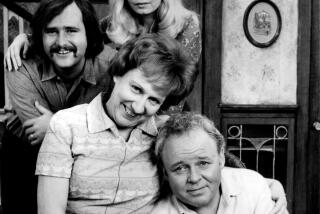‘All My Children’: Farewell to Pine Valley
- Share via
Forty-one years is a long time to spend in one town, but that’s how long I’ve been making a regular pilgrimage to Pine Valley, a fictional suburb of Philadelphia and the setting for “All My Children.” I missed days here and there — sometimes even months at a time — but I always returned.
On Friday, my regular visits will end. Although few television shows have had a more devoted fan base, the soap opera has been canceled. There are promises that the show will continue online, but fans are nevertheless mourning the end of an era.
When “All My Children” debuted in January 1970, I was a 17-year-old with no clear plan for the future. Over time, the daytime drama evolved into a touchstone, a way to chart my own life as the years passed. Viewers, myself included, rejoiced at the chance to leave mundane lives behind and enter into the sturm und drang of the show. Surely my time as a salesgirl at Bullock’s was much easier to get through on the days when I could stop into Pine Valley. And throughout my years as a student, and later as a writer, I always looked forward to a designated break, an entrance into a world in which the troubles and turmoil belonged to someone else.
The show’s title sequence begins with the opening of a book, clearly the book of life, filled with second chances, reversals of fortune, love found and love lost. The plot lines, always complicated and occasionally gothic, featured characters who returned from the dead and evil twins (including the fabulous David Canary, who played both Stuart and Adam Chandler for more than 20 years). There were mysterious men modeled on Heathcliff, and several first wives hidden away (a la the first Mrs. Rochester in “Jane Eyre”) in Oakhaven, the busy local psychiatric hospital. And there was an array of headstrong heroines, most notably the tormented but always victorious Erica Kane, played to perfection by Susan Lucci, the most famous diva of daytime.
Critics who disparage the art of the soap clearly have never been to Pine Valley. From the very start, creator Agnes Nixon has taken chances, dealing head-on with politically charged social issues. The show has dealt with issues of class, women’s rights and sexual orientation. TV’s first legal abortion was on “All My Children” (just months after Roe vs. Wade), and it was the first soap to have a story line about homosexuality (in 1983) as well as the first to have an ongoing major lesbian character, Bianca. It was the first to celebrate a same-sex marriage, and the first to deal with transgender issues — through an unforgettable transgender rock-star character. Regular viewers have also learned quite a lot about drug abuse, intervention and alcoholism.
In 1987, as the HIV crisis was raging, a character was discovered to have contracted AIDS, and Pine Valley’s reaction was not unlike that of the rest of America’s at the time. There were those who wanted the woman thrown out of town, and others who took on the role of providing accurate information about the disease. The cast has always been multiracial and multicultural, and Dr. Angela Hubbard and Jesse Hubbard (played by Debbi Morgan and Darnell Williams, respectively) have become perhaps the most popular African American couple on TV. Morgan and Williams started on the show decades ago, when their characters were star-crossed teenagers, and the show’s regulars have watched the Hubbards grow and change while always remaining devoted to each other.
You may not talk to a truly good friend for years, but a shared history makes it easy to reconnect once you sit down together again. That’s how it has been for fans of “All My Children.” The slower pacing of the daytime drama has allowed us to miss days, weeks and even years, yet still be able to pick up the story. I missed two seasons during graduate school, during which time I didn’t own a TV, but I watched every day during the year I was in treatment for cancer. And when I had small children, “All My Children” provided a crucial connection to the adult world.
To Agnes Nixon — and to the writers, directors and cast, some of whom have been my beloved neighbors for 41 years — I gratefully and humbly say thanks for the memories. Here’s to the future, for one and all.
Alice Hoffman is the author of “Practical Magic,” “The Story Sisters” and other novels. Her latest novel, “The Dovekeepers,” will be published in October.
More to Read
A cure for the common opinion
Get thought-provoking perspectives with our weekly newsletter.
You may occasionally receive promotional content from the Los Angeles Times.









